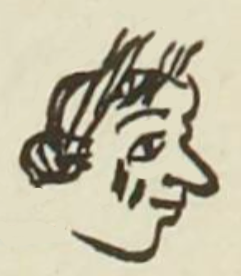Teicui (MH897r)
This black-line drawing of the simplex glyph for the personal name Teicui (“Young Girl”) is attested here as a woman’s name. The glyph shows the head of a woman in profile, facing the viewer’s right. This is not the head of the tribute payer herself, but the head of a woman provided with the intention of writing the name in hieroglyphs. She wears the hairstyle that puts the ends of her braids up above or next to her forehead, which is emblematic of her gender, but also conveys a sense of an adult woman, even while the meaning of “teicui” is meant to convey a young age. On her visible cheek, the two short vertical lines for the verb (huahuana, to paint stripes, or the “hua” syllable) serves as an phonographic and iconographic indicator that the glyph refers to a woman (cihuatl), even though the actual name is Teicui.
Stephanie Wood
It is interesting that a young girl (teicui) would be represented visually with the hairstyle (neaxtlahualli) that is associated with adult women. But perhaps this is because teicui is a near homophone with teicuic (“she coiled someone’s hair”). If so, then the hairstyle could be a phonetic complement and the glyph a compound. Incidentally, the tribute payer is a widow, and she has wrinkles on her visible cheek, which is a sign of her advanced age, in contrast with the head of the woman in the hieroglyph.
Stephanie Wood
maria teycui yllama
María Teicui, ilama
Stephanie Wood
1560
Jeff Haskett-Wood
género, gender, viudas, muchachas, jóvenes, cabello, juventud, nombres de mujeres

teicui, a young girl or the second of four tlazolteotl (divine forces of vice?), https://nahuatl.wired-humanities.org/content/teicui
Muchacha
Stephanie Wood
Matrícula de Huexotzinco, folio 897r, World Digital Library, https://www.loc.gov/resource/gdcwdl.wdl_15282/?sp=866&st=image.
This manuscript is hosted by the Library of Congress and the World Digital Library; used here with the Creative Commons, “Attribution-NonCommercial-ShareAlike 3.0 License” (CC-BY-NC-SAq 3.0).




